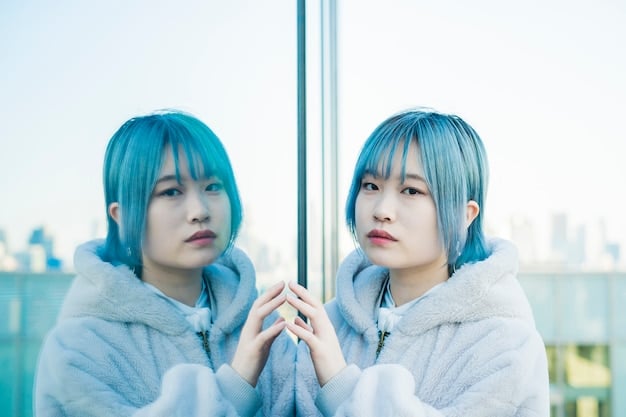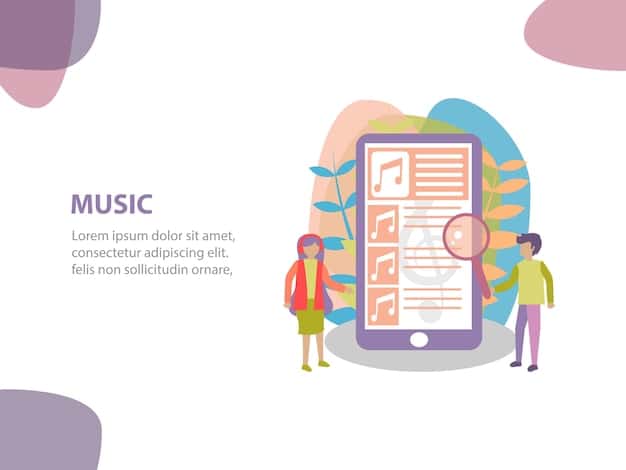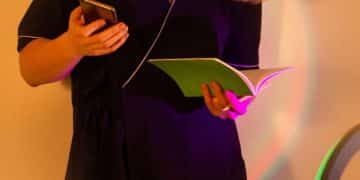Navigating K-Pop Copyright Laws: A 2025 Guide for US Fan Content Creators

Navigating K-Pop Copyright Laws in 2025 requires US-based fan content creators to understand fair use, licensing, and potential legal pitfalls to create engaging content without infringing on intellectual property rights.
Are you a US-based K-Pop fan eager to create content? Understanding and navigating K-Pop Copyright Laws: A Guide for US-Based Fan Content Creators in 2025 is crucial for staying on the right side of the law and protecting your creative endeavors.
Understanding Copyright Basics for K-Pop Fan Content
Copyright law protects the rights of creators, including those in the K-Pop industry. As a fan content creator in the US, it’s essential to grasp these basics to avoid potential legal issues. Let’s delve into what copyright entails and how it impacts your fan activities.
What is Copyright?
Copyright is a legal right granted to the creators of original works, including music, videos, and images. This right gives creators exclusive control over how their work is used, reproduced, or distributed.
How Copyright Applies to K-Pop Music and Videos
K-Pop songs, music videos, and performances are all protected by copyright. This means you can’t simply use these materials without permission from the copyright holders. These rights are often held by entertainment companies.
Key Copyright Concepts for Fan Creators
- Originality: Copyright protects original works, meaning content you create must have some degree of originality to be eligible for protection.
- Duration: Copyright protection lasts for a specific period, typically the life of the author plus 70 years.
- Infringement: Using copyrighted material without permission is considered infringement and can lead to legal consequences.
Understanding these basic concepts is the first step in navigating K-Pop Copyright Laws: A Guide for US-Based Fan Content Creators in 2025. Being aware of these rights can prevent unintentional copyright infringement related to creating derivative fan content.
Fair Use: A US Legal Doctrine for Fan Content Creation
Fair use is a US legal doctrine that allows limited use of copyrighted material without permission from the copyright holder. This doctrine is crucial for fan content creators, but it’s essential to understand its boundaries. Let’s explore what fair use means for K-Pop fan content.

The Four Factors of Fair Use
US courts consider four factors when determining whether a particular use qualifies as fair use:
- The purpose and character of the use, including whether such use is of a commercial nature or is for nonprofit educational purposes;
- The nature of the copyrighted work;
- The amount and substantiality of the portion used in relation to the copyrighted work as a whole; and
- The effect of the use upon the potential market for or value of the copyrighted work.
Applying Fair Use to K-Pop Fan Content
When creating K-Pop fan content, consider these factors. For example, using a short clip of a music video for a non-commercial review might be considered fair use. However, re-uploading an entire song or video is likely not.
Examples of Fair Use in Fan Creations
- Reviews and Criticism: Using clips or excerpts to critique or review K-Pop songs or music videos.
- Parodies: Creating parodies that transform the original work in a humorous or satirical way.
- Educational Purposes: Using copyrighted material for non-profit educational purposes, such as teaching a dance class.
Understanding fair use and how it applies to your specific content is key to navigating K-Pop Copyright Laws: A Guide for US-Based Fan Content Creators in 2025. Err on the side of caution and seek legal advice if unsure.
Licensing Options for K-Pop Content
Licensing is another avenue for using K-Pop content legally. This involves obtaining permission from the copyright holder to use their work in exchange for certain conditions, such as payment or attribution. Understanding licensing can open doors for creative fan projects.
Types of Licenses Available
Several types of licenses may be available, depending on the copyright holder and the intended use of the content:
- Synchronization License: For synchronizing music with visual content, such as in a video.
- Mechanical License: For reproducing and distributing copies of a song.
- Public Performance License: For performing music publicly, such as in a live event.
How to Obtain a License
To obtain a license, you typically need to contact the copyright holder, often the entertainment company or a licensing agency. Be prepared to provide details about your intended use of the content.
Creative Commons Licenses
Some K-Pop creators may use Creative Commons licenses, which offer more flexible terms for using their work. Check the specific license to understand what’s allowed such as whether the content is for non-commercial use only or whether you can adapt the content.
 “Contact the Licensing Agency” -> “Negotiate Terms” -> “Receive License Agreement” -> “Use Music Legally.” The design should be clean and easy to follow, visually representing the legal path to using copyrighted material.” class=”aligncenter size-large”/>
“Contact the Licensing Agency” -> “Negotiate Terms” -> “Receive License Agreement” -> “Use Music Legally.” The design should be clean and easy to follow, visually representing the legal path to using copyrighted material.” class=”aligncenter size-large”/>
Exploring licensing options can provide a legal and ethical way to use K-Pop content in your fan creations. Ensure you understand the terms and conditions of any license you obtain to remain compliant with navigating K-Pop Copyright Laws: A Guide for US-Based Fan Content Creators in 2025.
Avoiding Copyright Infringement: Best Practices
Avoiding copyright infringement is crucial for maintaining a positive presence in the K-Pop fan community. By following best practices, you can minimize the risk of legal issues and support the artists you love. Let’s review some essential guidelines.
Attribution and Credit
Always give proper credit to the original creators of the content you use. This includes naming the artist, song, and any other relevant information. Don’t pass someone else’s hard work off as your own.
Transformative Use
Focus on creating transformative content that adds something new and original to the existing work. This can increase the likelihood of your use being considered fair use. Remember, the goal is to creatively add to the existing art, whilst also giving appropriate credit.
Seeking Permission
When in doubt, seek permission from the copyright holder. Contact the entertainment company or licensing agency to ask for permission to use their content. When reaching out remember to include how you expect to use the content.
Adhering to these best practices can significantly reduce the risk of copyright infringement and help you navigate navigating K-Pop Copyright Laws: A Guide for US-Based Fan Content Creators in 2025 confidently.
The Role of DMCA in Protecting K-Pop Content
The Digital Millennium Copyright Act (DMCA) plays a significant role in protecting K-Pop content online. Understanding how the DMCA works can help you avoid legal issues and respect copyright laws. Let’s explore DMCA’s impact on fan content creation.
What is the DMCA?
The DMCA is a US copyright law that addresses digital copyright issues. It provides a framework for copyright holders to protect their content online and for online service providers to address copyright infringement.
DMCA Takedown Notices
Under the DMCA, copyright holders can send takedown notices to online service providers, such as YouTube or social media platforms, requesting the removal of infringing content. If you receive a takedown notice, it’s important to respond promptly and appropriately.
The DMCA Safe Harbor Provisions
The DMCA also provides safe harbor provisions for online service providers, protecting them from liability for copyright infringement by their users, provided they comply with certain requirements, such as having a system for addressing takedown notices. It is the website or platforms responsibility to take down the videos if copyright infringement has occurred.
Being aware of the DMCA and its implications can help you navigate navigating K-Pop Copyright Laws: A Guide for US-Based Fan Content Creators in 2025 effectively. Respecting copyright laws and responding appropriately to takedown notices are essential for maintaining a positive online presence.
Future Trends in K-Pop Copyright Law
As the K-Pop industry continues to evolve, so too will copyright laws. Staying informed about future trends and developments is crucial for fan content creators. Let’s discuss some trends to watch out for in the coming years.
Increased Enforcement of Copyright
With the growing popularity of K-Pop, entertainment companies are likely to increase their enforcement of copyright laws. This could mean more takedown notices and legal actions against infringers. It is better to be safe than sorry! Be sure to research and ensure no copyright is being broken with your fan content.
Technological Advancements
Advancements in technology, such as AI and blockchain, may offer new ways to protect and manage copyright. These technologies could also make it easier to detect and prevent infringement. These new technological advancements will be useful, and it is important to embrace them.
International Agreements
International agreements and treaties play a role in protecting copyright across borders. Staying informed about these agreements can help you navigate copyright laws when creating content for international audiences. It is important to know about the different copyright laws depending on what country you reside in.
By keeping an eye on these future trends, you can proactively adapt your content creation strategies and ensure compliance with navigating K-Pop Copyright Laws: A Guide for US-Based Fan Content Creators in 2025.
| Key Concept | Brief Description |
|---|---|
| ©️ Copyright | Legal protection for original works, granting exclusive rights to creators. |
| ⚖️ Fair Use | Limited use of copyrighted material without permission for purposes like criticism. |
| 🔑 Licensing | Obtaining permission from copyright holders to use their work under specific terms. |
| 🛡️ DMCA | US law addressing digital copyright issues, including takedown notices for infringement. |
FAQ
▼
Copyright infringement is using copyrighted material without permission, violating the exclusive rights granted to the copyright holder. This includes unauthorized reproduction, distribution, or display of protected works.
▼
Assess your content against the four fair use factors: purpose, nature of the copyrighted work, amount used, and market impact. Transformative, non-commercial uses are more likely to qualify. It is advised to seek legal counsel for definitive answers.
▼
Review it promptly, assess the claim’s validity, and either remove the content or file a counter-notice if you believe the takedown was in error. Seeking legal advice is recommended, if need be.
▼
Yes, the US Copyright Office and legal aid societies provide information and resources on copyright law and fair use. Additionally, several online resources offer guidance on creating fan content responsibly.
▼
The frequency varies. Some companies are more vigilant about copyright enforcement than others. Monitor your content and be prepared to address any notices promptly to avoid legal issues and maintain community goodwill.
Conclusion
By understanding copyright law, fair use, licensing options, and the DMCA, US-based K-Pop fan content creators can navigate the legal landscape with confidence in 2025. By following best practices and staying informed, you can create content that celebrates K-Pop while respecting the rights of creators and artists.





